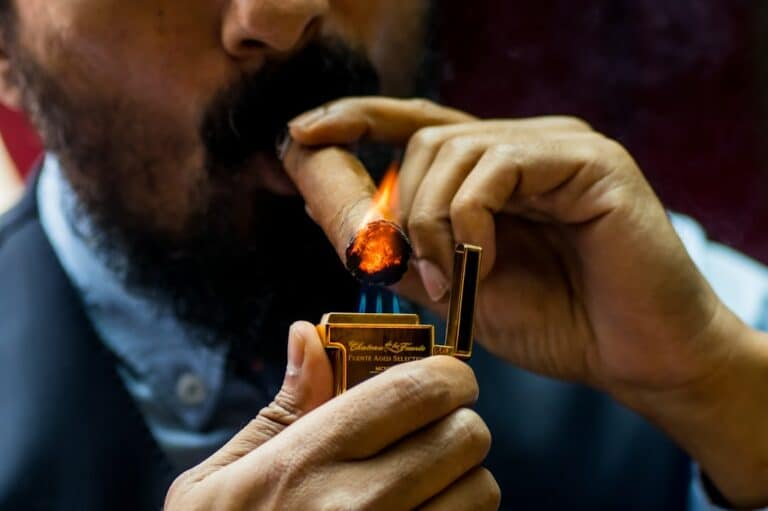Where did Cigars originate : A Cigar History
Cigars have a rich and storied history that dates back centuries, with their origins rooted in the indigenous cultures of the Americas. You might be surprised to learn that the practice of smoking tobacco in rolled leaves can be traced back to the ancient civilizations of the Caribbean, where the Taino people were among the first to cultivate and enjoy this plant. They would roll tobacco leaves into cylindrical shapes, creating what we now recognize as cigars.
This early form of smoking was not merely a recreational activity; it held significant cultural and spiritual importance, often used in rituals and ceremonies. As you delve deeper into the origins of cigars, you will discover that the word “cigar” itself is derived from the Spanish term “cigarro,” which was influenced by the Mayan word “sikar,” meaning “to smoke.” This connection highlights the deep-rooted relationship between tobacco and various indigenous cultures. The introduction of cigars to European society marked a pivotal moment in their history, as they began to gain popularity among the elite and eventually spread across the continent.
The journey of cigars from their humble beginnings to becoming a symbol of luxury and sophistication is a fascinating tale that reflects broader social and economic changes.
Key Takeaways
- Cigars have a long history, with origins dating back to ancient civilizations such as the Mayans and the Aztecs.
- Cigars were first introduced to Europe by Christopher Columbus and quickly gained popularity among the elite.
- The cigar industry saw significant growth with the development of cigar production centers in countries like Cuba and the Dominican Republic.
- Cigars have played a significant role in American history, from being smoked by early settlers to becoming a symbol of luxury and status.
- Cigars have had a lasting impact on culture and society, influencing fashion, art, and social gatherings.
The Early History of Cigars: From the Caribbean to Europe
The transition of cigars from the Caribbean to Europe is a captivating chapter in their history. When Christopher Columbus arrived in the New World in 1492, he encountered the Taino people smoking rolled tobacco leaves. Intrigued by this practice, he brought tobacco back to Spain, where it quickly captured the attention of the Spanish court.
You can imagine how this exotic new product sparked curiosity and fascination among European nobility, leading to its rapid adoption across various social classes. As cigars made their way through Europe, they underwent a transformation in both production and perception. Initially, they were hand-rolled by skilled artisans, and their popularity soared among the aristocracy.
By the 17th century, cigar smoking had become a fashionable pastime in countries like France and England. You might find it interesting that this period also saw the establishment of tobacco plantations in various European colonies, which further fueled the demand for cigars. The early history of cigars is not just about their journey across oceans; it reflects a broader cultural exchange that shaped societal norms and preferences.
Cigar Production and Trade: The Rise of the Cigar Industry

As you explore the rise of the cigar industry, you’ll notice that it was driven by both innovation and demand. The 19th century marked a significant turning point in cigar production, with advancements in manufacturing techniques that allowed for greater efficiency and consistency. The introduction of machinery revolutionized the way cigars were made, enabling mass production while still maintaining quality.
This shift not only made cigars more accessible to the general public but also established a thriving industry that would become a cornerstone of many economies. Trade played a crucial role in the expansion of the cigar market. You may find it fascinating that countries like Cuba emerged as key players in cigar production, renowned for their high-quality tobacco and skilled craftsmanship.
The establishment of trade routes facilitated the export of cigars to various parts of the world, solidifying their status as a luxury item. As you consider the economic implications, it’s clear that the rise of the cigar industry was not just about individual enjoyment; it became intertwined with global commerce and cultural exchange.
Cigars in America: From Colonial Times to the Present
Cigars have a unique place in American history, evolving from colonial times to become an integral part of contemporary culture. In the early days of American colonization, tobacco was one of the first cash crops cultivated by settlers. You might be surprised to learn that cigars gained popularity in America during the 19th century, particularly among immigrants who brought their own traditions and preferences for smoking.
This influx of diverse cultures contributed to a rich tapestry of cigar-making techniques and flavors. As you trace the evolution of cigars in America, you’ll find that they became associated with various social movements and cultural shifts. The post-Civil War era saw a surge in cigar consumption, with men often enjoying cigars as symbols of camaraderie and celebration.
You may also note how cigars became linked to iconic figures in American history, from politicians to celebrities, further embedding them into the national consciousness. Today, cigars continue to thrive in America, with a vibrant community of enthusiasts who appreciate both traditional craftsmanship and modern innovations.
The Influence of Cigars on Culture and Society
Cigars have long been more than just a means of indulgence; they have played a significant role in shaping culture and society. You might find it intriguing how cigars have been depicted in literature, film, and art throughout history. From classic novels to Hollywood films, cigars often symbolize power, sophistication, and rebellion.
Characters who smoke cigars are frequently portrayed as confident and charismatic, reinforcing their status as cultural icons. Moreover, cigars have served as social lubricants, facilitating connections between individuals across various walks of life. You may have experienced how sharing a cigar can create an atmosphere of camaraderie and conversation, whether among friends or business associates.
This social aspect has contributed to the establishment of cigar lounges and clubs where enthusiasts gather to share their passion for this timeless tradition. As you reflect on the influence of cigars on culture and society, it’s clear that they transcend mere consumption; they embody shared experiences and connections that resonate across generations.
The Evolution of Cigar Manufacturing and Technology

The Coexistence of Artisanal Craftsmanship and Modern Technology
The evolution of cigar manufacturing is a testament to human ingenuity and adaptability. As you explore this journey, you’ll discover how traditional hand-rolling techniques have coexisted with modern technology to create a diverse range of products. While artisanal craftsmanship remains highly valued, advancements in machinery have allowed for increased efficiency without compromising quality.
Advancements in Production and Aging
You might be surprised to learn that some manufacturers now employ sophisticated technology to monitor humidity levels and ensure optimal aging conditions for their cigars. This attention to detail has significantly improved the quality of the final product.
Packaging: A Key Aspect of the Evolution
In addition to production methods, packaging has also evolved significantly over time. You may appreciate how contemporary packaging not only serves practical purposes but also enhances branding and marketing efforts. Eye-catching designs and innovative materials have transformed how cigars are presented to consumers, making them more appealing than ever before.
The Global Impact of Cigars: From Cuba to the Rest of the World
Cuba has long been synonymous with premium cigars, renowned for its rich soil and ideal climate for tobacco cultivation. As you delve into this topic, you’ll find that Cuban cigars have become a symbol of luxury and craftsmanship worldwide. The global impact of cigars extends far beyond Cuba’s borders; countries like Nicaragua, the Dominican Republic, and Honduras have emerged as significant players in the industry, each contributing unique flavors and styles.
The international appeal of cigars has fostered a sense of community among enthusiasts across different cultures. You might find it fascinating how cigar festivals and events draw people together from around the globe to celebrate their shared passion. This global network not only promotes cultural exchange but also supports local economies through tourism and trade.
As you reflect on the global impact of cigars, it’s clear that they serve as more than just products; they are conduits for connection and appreciation across diverse cultures.
The Future of Cigars: Trends and Challenges in the Modern Era
As you look toward the future of cigars, you’ll encounter both exciting trends and significant challenges facing the industry today. One notable trend is the growing interest in premium and artisanal products among consumers who seek unique experiences rather than mass-produced items. This shift has led to a resurgence in small-batch production and limited-edition releases that cater to discerning palates.
However, challenges loom on the horizon as well. Regulatory pressures surrounding tobacco products continue to evolve, impacting marketing strategies and accessibility for consumers. You may also consider how changing societal attitudes toward smoking could influence future consumption patterns.
As you contemplate these trends and challenges, it’s clear that the future of cigars will require adaptability and innovation while remaining true to their rich heritage. In conclusion, your exploration of cigars reveals a multifaceted narrative that spans centuries and continents. From their origins among indigenous cultures to their status as global symbols of luxury, cigars have left an indelible mark on history and society.
As you reflect on this journey, you may appreciate how cigars continue to evolve while remaining deeply rooted in tradition—a testament to their enduring appeal across generations.
If you are interested in learning more about how to properly care for your cigars, check out this helpful article on how to take care of cigars. Proper storage and maintenance are essential for preserving the flavor and quality of your cigars. Additionally, for tips on how to fully enjoy smoking your cigar, be sure to read this informative article on tips to enjoy smoking your cigar. These resources will enhance your cigar smoking experience and help you appreciate the rich history and tradition behind this beloved pastime.
FAQs
What is the origin of cigars?
Cigars originated in the Caribbean, specifically in the region of the Yucatan Peninsula, which includes parts of modern-day Mexico, Belize, and Guatemala.
When were cigars first made?
The indigenous people of the Caribbean were the first to make and smoke cigars, with evidence of cigar smoking dating back to as early as the 10th century.
How did cigars spread to other parts of the world?
Cigars were introduced to Europe by Christopher Columbus and his crew upon their return from the New World in the late 15th century. From there, the popularity of cigars spread to other parts of the world.
What role did Cuba play in the history of cigars?
Cuba has long been associated with the production of high-quality cigars, and it remains one of the most famous cigar-producing countries in the world. The Cuban cigar industry has had a significant impact on the global cigar market.
How have cigars evolved over time?
Cigars have evolved from being a product of indigenous Caribbean cultures to becoming a global luxury item. The methods of cultivation, production, and consumption of cigars have also evolved over time.






